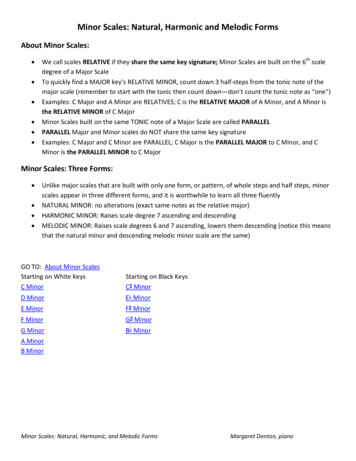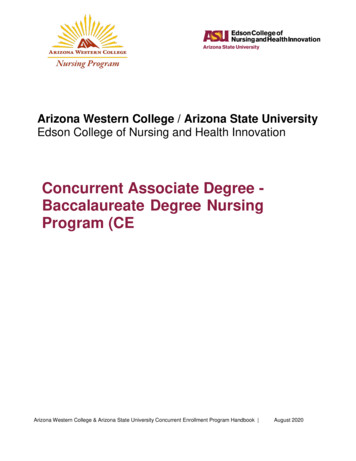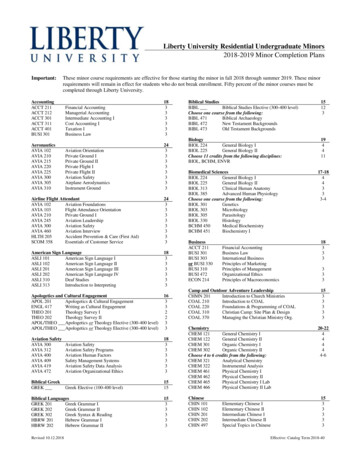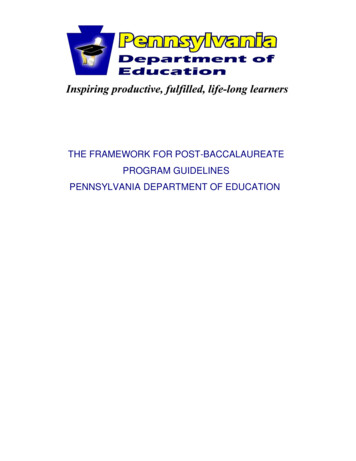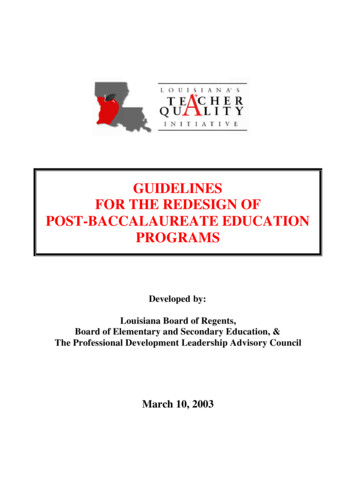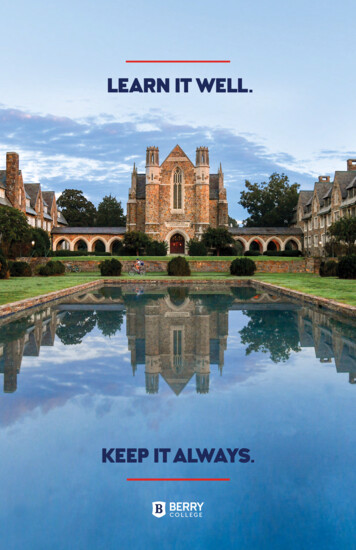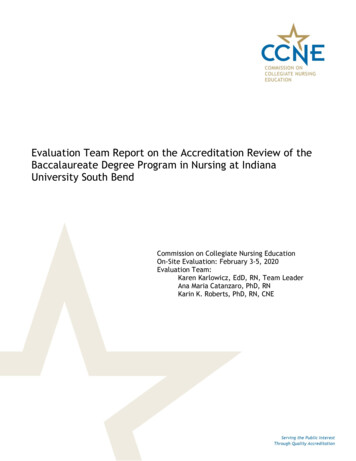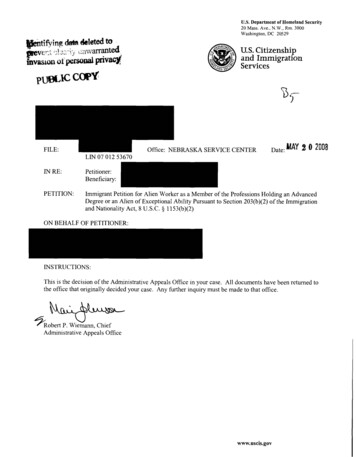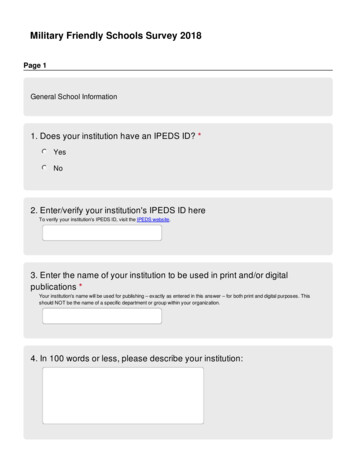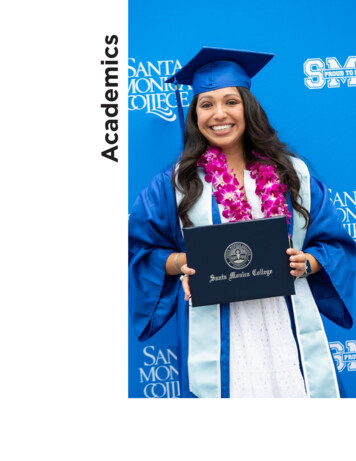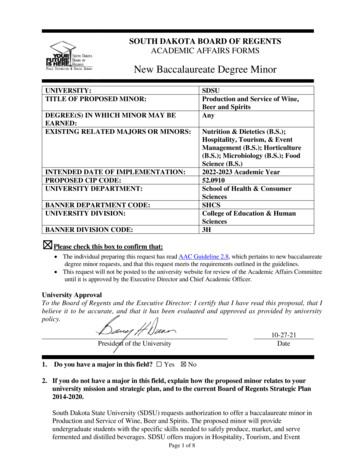
Transcription
SOUTH DAKOTA BOARD OF REGENTSACADEMIC AFFAIRS FORMSNew Baccalaureate Degree MinorUNIVERSITY:TITLE OF PROPOSED MINOR:DEGREE(S) IN WHICH MINOR MAY BEEARNED:EXISTING RELATED MAJORS OR MINORS:INTENDED DATE OF IMPLEMENTATION:PROPOSED CIP CODE:UNIVERSITY DEPARTMENT:BANNER DEPARTMENT CODE:UNIVERSITY DIVISION:BANNER DIVISION CODE:SDSUProduction and Service of Wine,Beer and SpiritsAnyNutrition & Dietetics (B.S.);Hospitality, Tourism, & EventManagement (B.S.); Horticulture(B.S.); Microbiology (B.S.); FoodScience (B.S.)2022-2023 Academic Year52.0910School of Health & ConsumerSciencesSHCSCollege of Education & HumanSciences3H Please check this box to confirm that: The individual preparing this request has read AAC Guideline 2.8, which pertains to new baccalaureatedegree minor requests, and that this request meets the requirements outlined in the guidelines. This request will not be posted to the university website for review of the Academic Affairs Committeeuntil it is approved by the Executive Director and Chief Academic Officer.University ApprovalTo the Board of Regents and the Executive Director: I certify that I have read this proposal, that Ibelieve it to be accurate, and that it has been evaluated and approved as provided by universitypolicy.President of the University1.10-27-21DateDo you have a major in this field? Yes No2. If you do not have a major in this field, explain how the proposed minor relates to youruniversity mission and strategic plan, and to the current Board of Regents Strategic Plan2014-2020.South Dakota State University (SDSU) requests authorization to offer a baccalaureate minor inProduction and Service of Wine, Beer and Spirits. The proposed minor will provideundergraduate students with the specific skills needed to safely produce, market, and servefermented and distilled beverages. SDSU offers majors in Hospitality, Tourism, and EventPage 1 of 8
South Dakota State UniversityNew Minor: Production and Service of Wine, Beer and SpiritsManagement and Nutrition and Dietetics. A minor in the Production and Service of Wine, Beer,and Spirits will allow students in these majors to diversify their education and strengthen theirpost-graduate career opportunities. This minor will also benefit and appeal to students in areassuch as Horticulture, Entrepreneurial Studies, Microbiology, and Food Science.The Production and Service of Wine, Beer and Spirits minor supports the mission of SDSU asprovided in SDCL 13-58-1: The legislature established South Dakota State University as theComprehensive Land-Grant University to meet the needs of the State and region by providingundergraduate and graduate programs of instruction in the liberal arts and sciences andprofessional education in agriculture, aviation, education, engineering, human sciences, nursing,pharmacy, and other courses or programs as the Board of Regents may determine. The proposedminor will contribute to SDSU’s mission of providing engaging student-centered instruction thatcontributes to the workforce development in South Dakota. The fermented beverage industry is anew one in South Dakota that is expanding and needs qualified employees with skills gained fromthis program.In March 2020, House Bill 1081 passed and allowed that a “postsecondary institution mayproduce up to two hundred gallons of distilled spirits, up to two hundred gallons of maltbeverage, and up to two hundred gallons of wine each year, and securely store up to twohundred gallons of each at any given time, for purposes of research and offering bona fideeducational courses instructing students in the production and serving of distilled spirits, maltbeverage, or wine.”1SDSU does not request new state resources.3. What is the nature/purpose of the proposed minor? Please include a brief (1-2 sentence)description of the academic field in this program.The proposed minor is intended to provide students with a general understanding and the skills inproducing, marketing, and serving wine, beer, and spirits. This is an interdisciplinary minor thatspans the areas of nutrition, hospitality management, human resource management, andmarketing.This minor provides students the science and techniques behind brewing and fermentation ofdifferent beverages, as well as rigorous procedures for the sanitation and safe handling/serving ofalcoholic beverages. Students will learn how to appropriately develop flavors in distilledbeverages and how to pair them appropriately with food. Marketing, management, and customerservice are also components of this minor.4. How will the proposed minor benefit students?This minor provides students with a package of coursework that will make them more readilyemployable across numerous sectors including hospitality, tourism, nutrition, food service, andsmall business development. Students will have a demonstrable skills-set that can be marketed toprospective employers. The brewing, viticulture, and distilling industry is relatively new in SouthDakota compared to other states. This minor will produce graduates with foundational skills,including the legal requirements to be employed in production, marketing, and/or service of thebeverages or establish their own business in producing and/serving the uments/68333.pdf and ge 2 of 8
South Dakota State UniversityNew Minor: Production and Service of Wine, Beer and SpiritsThe minor will appeal to students majoring in Hospitality, Tourism, and Event Management;Nutrition and Dietetics; Horticulture; Entrepreneurial Studies; Microbiology; and Food Science.5. Describe the workforce demand for graduates in related fields, including national demandand demand within South Dakota. Provide data and examples; data sources may include butare not limited to the South Dakota Department of Labor, the US Bureau of Labor Statistics,Regental system dashboards, etc. Please cite any sources in a footnote.The United States wine, beer and distilled spirits industry provides major economic contributionsto the US economy. Total alcoholic beverage sales in the United States amounted toapproximately 252 billion U.S. dollars in 2019 (Figure 1).2 Additionally, this proposed programsupports the hospitality industry. Per the Emsi April 2021 South Dakota Board of RegentsProgram Demand Gap Analysis, the hospitality industry has a high demand and low supply ofworkforce.3 This program will assist in providing trained personnel to meet industry needs.Figure 1. Total alcoholic beverage sales in the United States from 2006 to 2019.The South Dakota wine, beer, and distillation industries while still in their infancy, are growingsteadily and poised to make great contributions in the future. In 2011, SD had five craftbreweries, this number grew to 33 in 20204. South Dakota’s wine industry is also growing. In1996, South Dakota’s first winery opened. The number of wineries had grown to 205.Wine (viticulture) production and service coursework offerings are limited in the northern plains.South Central College in Mankato6, Minnesota, Des Moines Area Community College, andHighland Community College offer certificates in viniculture and enology. There are alsocertificate programs offered at institutions in Arkansas, California, Colorado, New York,Pennsylvania, North Carolina, Ohio, Michigan, Missouri, and Washington. Individual courseworkis also offered at offered at Iowa State University,7 University of Minnesota,8 and University otal-alcoholic-beverages-sales-since-1990/Emsi April 2021 South Dakota Board of Regents Program Demand Gap Analysis: Economic Overview and Review ofAcademic tics-and-data/state-craft-beer-stats/?state hsp .do?courseId 794871Page 3 of 83
South Dakota State UniversityNew Minor: Production and Service of Wine, Beer and SpiritsNebraska.9 As this proposed minor program in wine, beer and distilled spirits combines thesethree areas, it would be unique in the region, while serving the needs of students and thewine/beer/distilled spirits industry.This minor provides students with a package of coursework that will make them more readilyemployable in the brewing, wine production, distilled spirits industries. Students will have ademonstrable skills-set that includes knowledge on how to produce the products, experience inproducing the beer and wine, knowledge on the specific ingredients and required quality for theproducts, knowledge on the specifics required to market and serve these beverages. Students willalso have knowledge on how to pair the beverage with a specific food to ensure a properconsumer experience.6. Provide estimated enrollments and completions in the table below and explain themethodology used in developing the estimates.The estimates are developed based on 25% of the senior level students currently majoring inHospitality, Tourism, and Event Management and Nutrition and Dietetics acquiring the minor.Also, it is anticipated to see a growth of 5 additional students per year from majors such as FoodScience, Horticulture, Microbiology, Business Economics, and Entrepreneurial Studies.1stEstimatesStudents enrolled in the minor (fall)Completions by graduatesFY 23100Fiscal Years*2nd3rdFY 24FY 251520034thFY 26255*Do not include current fiscal year.7. What is the rationale for the curriculum? Demonstrate/provide evidence that thecurriculum is consistent with current national standards.The proposed minor is comprised of courses selected from programs in the School of Health andConsumer Sciences, Ness School of Management and Economics, and Department of Agronomy,Horticulture and Plant Science. Through completion of the minor, students will gain a wellrounded knowledge of the brewing, wine production, and distilled spirits industries tocomplement their field of study.There is not a national accrediting body or educational organization. The Viticulture and Enologyprogram and Master Brewer’s program offered by University of California-Davis10,11,12 were usedin planning. A national industry leader in the wine industry provided consultation and access tohis viticulturists and production team to address necessary skill and knowledge requirementsfrom that field. Additionally, we solicited information from local brewing industry leaders aboutthe skills required for beer ificate-program.10Page 4 of 8
South Dakota State UniversityNew Minor: Production and Service of Wine, Beer and Spirits8. Complete the tables below. Explain any exceptions to Board policy requested.A. Distribution of Credit HoursProduction and Service of Wine, Beer and Spirits Minor Credit Hours PercentRequirements in minor1368-72%Electives in minor5-628-32%Total18-19100%B. Required Courses in the ourse TitleFoodservice SanitationFoodservice Operations andPurchasing Management (3)415Sport and Recreation FacilityManagement (3)480-480L Introduction to Wine, Beer andSpirits and LabPrerequisites forCourseNoneNoneCreditNewHours (yes, no)1No3NoNoneParticipants mustbe 21 years of ageor older to enroll.3No482Hospitality Marketing426-426L Production of Wine Beer Spirits Participants mustand Labbe 21 years of ageor older to enroll.Subtotal33NoNo13Students must be 21 years of age or older to complete NUTR 426-426L Production of WineBeer Spirits and Lab and HMGT 480-480L Introduction to Wine, Beer and Spirits and Lab.C. Elective Courses in the Minor: List courses available as electives in the program.Indicate any proposed new courses added specifically for the minor.Select 5-6 credits from the following UTRRECR141-141L Food Principles and Lab415Sport and Recreation FacilityManagement1213Course TitleLegal Environment of BusinessHospitality Industry LawFoodservice Operations andPurchasing Management13Fruit Crop Systems(may be repeated with differentmodules)Human Resource ManagementPrerequisites forCourseNoneHGMT 171NoneCredit NewHours (yes, no)3No3No3NoNone1NoBADM/MGMT360 (3 cr.)NoneNone3No43NoNoEither HMGT 380 Foodservice Operations and Purchasing Management (3 cr.) or RECR 415 Sport and RecreationFacility Management (3 cr.) may be completed as an elective course if not selected in the required coursework.Page 5 of 8
South Dakota State UniversityNew Minor: Production and Service of Wine, Beer and SpiritsThe minor requires 18-19 credits unless the student selects HRM 460 Human ResourceManagement as one of the elective courses then the number of credits increases to 21-22.However, at SDSU, over 17 majors include BADM/MGMT 360 as part of the major orsupporting requirements. This includes the Hospitality, Tourism, and Event Management;Nutrition and Dietetics; Horticulture; Business Economics; and Entrepreneurial Studiesmajors. The student who chooses HRM 460 for the elective will more than likely already havethe prerequisite completed.9. What are the learning outcomes expected for all students who complete the minor? Howwill students achieve these outcomes?At the completion of the Production and Service of Wine, Beer and Spirits minor, students will beable to: Produce wine and beer. Describe how to produce distilled spirits. Demonstrate understanding of the role played by the component ingredients in wine, beer, anddistilled spirits. Properly taste test wine and beer following applicable industry protocols.Understand and manage the responsible service and consumption of alcoholic beverages.Demonstrate understanding the management of the food operations that serve alcoholicbeverages.Practice management principles and procedures related to the sale and service of alcoholic andspecialty beverages.Implement marketing strategies including demographics, image development, advertising,sales promotion, public relations, administering and controlling a marketing plan.Become certified through the National Restaurant Association upon successful completion ofthe online ServSafe Food Protection Manager Certification Exam.Individual StudentOutcomesStudents will be able toproduce wine and beer.Students will be able todescribe how to producedistilled spirits.Students will be able todemonstrate understandingof the role played by thecomponent ingredients inwine, beer, and distilledspirits.Students will be able toproperly taste test wine andbeer following applicableindustry protocol.Students will be able tounderstand and manage theresponsible service andconsumption of alcoholicbeverages.HMGTBLAW HMGT HMGT HMGT 480- HMGTHRM350251*361380* 480L* 482* HO 411 460NUTRNUTR 426- RECR141426L* 415*XXXXXPage 6 of 8XX
South Dakota State UniversityNew Minor: Production and Service of Wine, Beer and SpiritsIndividual StudentOutcomesStudents will be able todemonstrate understandingthe management of the foodoperations that servealcoholic beverages.Students will be able topractice managementprinciples and proceduresrelated to the sale andservice of alcoholic andspecialty beverages.Students will be able toimplement marketingstrategies includingdemographics, imagedevelopment, advertising,sales promotion, publicrelations, administering andcontrolling a marketing plan.Students will be able tobecome certified through theNational RestaurantAssociation upon successfulcompletion of the onlineServSafe Food ProtectionManager Certification Exam.*Required coursework.HMGTBLAW HMGT HMGT HMGT 480- HMGTHRM350251*361380* 480L* 482* HO 411 460XXXXNUTRNUTR 426- RECR141426L* 415*XXXXXX10. What instructional approaches and technologies will instructors use to teach courses in theminor? This refers to the instructional technologies and approaches used to teach courses andNOT the technology applications and approaches expected of students.The coursework associated with this minor is delivered in a face-to-face environment with somecourses having a hands-on laboratory. Students must be 21 to complete NUTR 426-426LProduction of Wine Beer Spirits and Lab and HMGT 480-480L Introduction to Wine, Beer andSpirits and Lab.11. Delivery LocationA. Complete the following charts to indicate if the university seeks authorization to deliverthe entire program on campus, at any off campus location (e.g., USD Community Centerfor Sioux Falls, Black Hills State University-Rapid City, Capital City Campus, etc.) ordeliver the entire program through distance technology (e.g., as an online program)?On campusYes/NoYesOff campusYes/NoNoIntended Start Date2022-2023 Academic YearIf Yes, list location(s)Page 7 of 8Intended Start Date
South Dakota State UniversityNew Minor: Production and Service of Wine, Beer and SpiritsYes/NoIf Yes, identify delivery methodsIntended Start DateDelivery methods are defined in AACGuideline 5.5.Distance Delivery(online/other distancedelivery methods)Does another BORinstitution alreadyhave authorization tooffer the programonline?NoNoIf yes, identify institutions:B. Complete the following chart to indicate if the university seeks authorization to delivermore than 50% but less than 100% of the minor through distance learning (e.g., as anonline program)? This question responds to HLC definitions for distance delivery.Distance Delivery(online/other distancedelivery methods)Yes/NoNoIf Yes, identify delivery methodsIntended Start Date12. Does the University request any exceptions to any Board policy for this minor? Explainany requests for exceptions to Board Policy. If not requesting any exceptions, enter “None.”AAC Guideline 2.8 limits minors to eighteen credit hours unless valid reasons exist to exceedthe limit. As noted in question 8.E if a student selects HRM 460 as one of the elective coursesthen the number of credits increases to 21-22.13. Cost, Budget, and Resources: Explain the amount and source(s) of any one-time andcontinuing investments in personnel, professional development, release time, timeredirected from other assignments, instructional technology & software, other operationsand maintenance, facilities, etc., needed to implement the proposed minor. Address offcampus or distance delivery separately.All courses are currently being taught. SDSU does not require any additional resources to offerthis minor.14. New Course Approval: New courses required to implement the new minor may receiveapproval in conjunction with program approval or receive approval separately. Pleasecheck the appropriate statement. YES,the university is seeking approval of new courses related to the proposed program in conjunctionwith program approval. All New Course Request forms are included as Appendix C and matchthose described in section 7. NO,the university is not seeking approval of all new courses related to the proposed program inconjunction with program approval; the institution will submit new course approval requestsseparately or at a later date in accordance with Academic Affairs Guidelines.Page 8 of 8
certificate programs offered at institutions in Arkansas, California, Colorado, New York, Pennsylvania, North Carolina, Ohio, Michigan, Missouri, and Washington.Individual coursework is also offered at offered at Iowa State University, 7. 8University of Minnesota, and University of . 2
